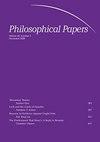安全性和错误可能性的无意识
IF 1.3
3区 哲学
0 PHILOSOPHY
引用次数: 0
摘要
在本文中,我首先寻求一个相对合理的安全原则的表述。为此,我驳斥邓肯·普里查德(Duncan Pritchard)最近提出的一种安全形式,然后为另一种较弱的安全形式辩护,即安全是知识的必要条件。其次,更重要的是,我指出这种较弱的安全性仍然是不够的,因为它忽略了人们对附近错误可能性的信念,这是一个在文献中大部分被忽略的因素,但它可以决定人们是否知道。然后,我发展了一种基于安全的知识描述,其中包含了关于附近错误可能性的信念元素。有人认为,这样的解释解决了各种有问题的情况,并为适应知识失败现象提供了有用的资源,同时保留了安全原则背后重要的反怀疑力量。本文章由计算机程序翻译,如有差异,请以英文原文为准。
Safety and Unawareness of Error-Possibility
Abstract In this paper, I first seek a relatively plausible formulation of the safety principle. To this end, I refute a recent form of safety by Duncan Pritchard and then defend another weaker form of safety as a necessary condition for knowledge. Second, and more importantly, I point out that this weaker safety is still insufficient, in that it neglects one’s belief regarding nearby error-possibilities—a factor that is largely omitted in the literature but could determine whether or not one knows. I then develop a safety-based account of knowledge that incorporates this element of belief concerning nearby error-possibilities. It is argued that such an account addresses various problematic cases and delivers useful resources for accommodating the phenomenon of knowledge-defeat, while preserving the important anti-skeptical power behind a safety principle.
求助全文
通过发布文献求助,成功后即可免费获取论文全文。
去求助
来源期刊

Philosophical Papers
PHILOSOPHY-
CiteScore
2.10
自引率
0.00%
发文量
18
期刊介绍:
Philosophical Papers is an international, generalist journal of philosophy edited in South Africa Original Articles: Articles appearing in regular issues are original, high-quality, and stand-alone, and are written for the general professional philosopher. Submissions are welcome in any area of philosophy and undergo a process of peer review based on initial editor screening and refereeing by (usually) two referees. Special Issues: Topic-based special issues are comprised of both invited and submitted papers selected by guest editors. Recent special issues have included ''Philosophy''s Therapeutic Potential'' (2014, editor Dylan Futter); ''Aging and the Elderly'' (2012, editors Tom Martin and Samantha Vice); ''The Problem of the Criterion'' (2011, editor Mark Nelson); ''Retributive Emotions'' (2010, editor Lucy Allais); ‘Rape and its Meaning/s’ (2009, editor Louise du Toit). Calls for papers for upcoming special issues can be found here. Ideas for future special issues are welcome.
 求助内容:
求助内容: 应助结果提醒方式:
应助结果提醒方式:


